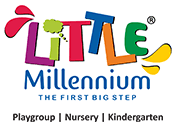
Foster Early Childhood Development By “Playing”
Play is the Best Form of Learning
“As astronauts and space travelers children puzzle over the future; as dinosaurs and princesses they unearth the past. As weather reporters and restaurant workers they make sense of reality; as monsters and gremlins they make sense of the unreal.”
Gretchen Owocki, An Early Childhood Educator and Author of “Literacy Through Play”
A little astronaut at play, pretending to travel through space in her spaceship, may look like mere child’s play to you, but these instances are much more than a child’s recreational and frivolous episodes. She is actually exploring, imagining, narrating and creating. And, she is accomplishing all this by following her most basic instinct – playing.
Most parents wonder, how’s that possible? What can children learn by just playing? How will they become successful in life if they spend their time jumping in puddles, creating stories and blowing bubbles?
Children are born learners. They have a natural curiosity to explore, discover and figure things out. Curiosity is the desire to learn, and play is the best way to inculcate this curiosity. They play because it is fun and adventure. Through the medium of play, they set simple tasks for themselves, decide on the success criteria, and at times, also establish a timeline for the challenge. With no apprehensions or fear of failure, they test and try until they succeed. Through play, children develop confidence and make sense of the world around them. When they’re completely and absolutely absorbed in their play, children develop important life skills without even realizing it.
Albert Einstein said, “Play is the highest form of research.”
Several studies by early childhood development experts and educators have shown that play is critical in early childhood as it lays a solid foundation for learning and is the medium through which children acquire a range of fundamental life skills which help them to be academically, socially and emotionally successful in years to come.
Core Strength Building – Early Childhood Development
When kids lift and throw the ball during a game of bowling, fly a paper plane or run around with a kite in their hand, they not only build strength in their core muscle groups, but also learn balancing and coordination. Similarly, Blowing bubbles helps them strengthen their speech muscles whereas squishing play dough and colouring with crayons, coordinates the small muscles in their hands and fingers, and prepares them for a major academic task – writing.
Thinking & Reasoning Skills – Early Childhood Development
Children learn to think, reason, and solve problems when they play. Playing with objects, in particular, allows them to observe, sort, compare and manipulate, leading to enhanced cognition. While constructive play with building blocks, puzzle pieces or board games helps develop logical reasoning skills, strategic and critical thinking; It also promotes knowledge of early math concepts like shapes and sizes, comparisons and contrasts, patters and symmetry. Building a castle with play sand or floating a paper boat in a bucket of water will spark interest in science as well as improve focus and concentration skills.
Learn New things – Early Childhood Development
Young learners also get an opportunity to develop language, speech, and vocabulary when they play. Whether they are roaring ‘vroom, vroom’ while playing with cars, identifying body parts while examining ‘patients’ with their doctor sets, or trying to identify different objects or creatures through a game, children observe, listen and pickup words during play. They learn new words and sounds, and also gain the ability to put them together and form sentences – a crucial requirement for success in school.
Inculcate Creativity – Early Childhood Development
Another extremely important skill that prepares children for school, as well as the life beyond it, is creativity. Play allows them to foster this key skill by encouraging new, original ideas, and gives them the liberty to question, experiment, and express themselves uniquely. Be it dancing and singing, doodling with paint and brush or tinkering with words, creative play helps children explore, persevere, and develop divergent and innovative thinking.
Nurture Imagination – Early Childhood Development
A key component of creativity, which cultivates social and emotional intelligence in children, is imagination. Whether they roar like a dinosaur while wearing T-Rex head gear, sing and chirp like birds with finger puppets or have an imaginary party with their friends, children learn cooperation, negotiation, sharing, and explore symbolic play through imaginative or pretend play. It is because of this imagination during childhood that, as adults, we are able to constantly visualize, solve problem, understand others’ perspectives, think creatively, innovate or invent new things. Children also develop self-confidence, self-awareness, self-control and self-expression through pretend play.
Play is essential for early learning, for it allows children to explore, experiment, and discover the mysteries of the world without restriction or fear. Spontaneous play is their way of mastering reality. As parents or child caretakers, it is our responsibility to ensure an environment that encourages play as a means to meet key developmental skills in young learners.
Summary
Play helps build healthy mind and bodies. Little Millennium Preschool associates high value to learning by playing. Our scientifically researched curriculum includes daily activities as part of the preschool curriculum in which kids learn by playing.
We at Little Millennium Preschool strongly believe, Play is not a break from learning, play is learning. It is the best form of learning for early childhood development
